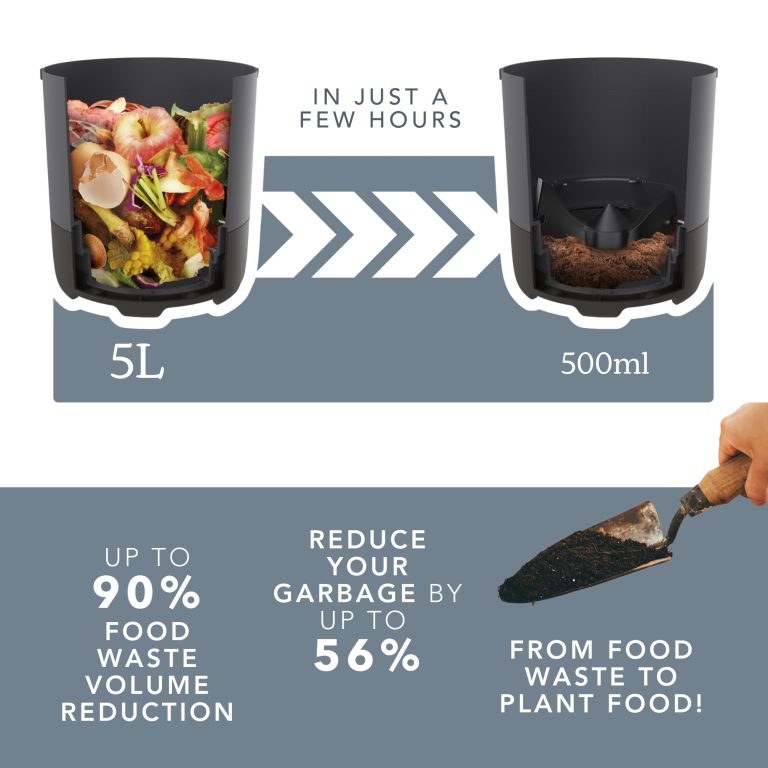Imagine transforming your kitchen into a zero-waste haven. Sounds intriguing, right?
You might be surprised to learn that a food processor could be your secret weapon in achieving this. If you’ve ever felt overwhelmed by the sheer amount of kitchen scraps or guilty about tossing uneaten food, you’re not alone. Many of us face this dilemma daily.
But what if you had the power to reduce this waste significantly? By harnessing the capabilities of a food processor, you can not only streamline your meal prep but also contribute to a more sustainable environment. It’s time to take control of your kitchen waste and make a positive change. Dive into this article to discover how a simple kitchen tool can revolutionize your waste management efforts. Your journey to a greener kitchen starts now.

Credit: www.instagram.com
The Role Of Food Processors In Waste Reduction
Food processors help cut down on kitchen waste. They turn scraps into useful ingredients. Leftover veggies can become soup or sauce. Old bread can be breadcrumbs. This means less food goes in the trash.
Processors are handy for families. They save time and reduce waste. Chopping, slicing, and mixing become easy. Kids can help too. It’s fun for them to see food change.
Using a food processor is smart. It keeps the kitchen clean. It helps the earth by reducing garbage. Everyone can do their part.
.jpg)
Credit: www.buzzsprout.com
Choosing The Right Food Processor
A good food processor should have a strong motor. This helps in chopping and blending easily. Look for sharp blades. They make cutting faster and cleaner. Size matters. Pick one that fits your kitchen space. A big processor can handle more food at once.
Energy efficiency is important. It saves power and reduces bills. Choose models with low energy use. Sustainability counts too. Look for processors made from recycled materials. This helps the environment. Some processors have parts you can replace. This makes them last longer. Less waste this way.
Effective Techniques For Minimizing Waste
Keep food fresh with airtight containers. Use the right temperature for each item. Vegetables last longer in a crisper drawer. Label foods with dates. This helps avoid spoilage. Store leftovers in clear containers. You can see them easily and use them first.
Leftovers are not waste. They can be new meals. Make soup from leftover vegetables. Blend fruits for a smoothie. Mix rice with veggies for a stir-fry. Plan meals around what you have. This saves food and money.

Credit: m.facebook.com
Creative Uses For Food Scraps
Using vegetable peels and chicken bones makes tasty broths. Broths are warm and healthy. They are easy to make. Add scraps to a pot with water. Boil them slowly. This creates a rich flavor. Save money by using scraps. Broths can be used in many dishes. Soups, stews, and sauces taste better with homemade broth. Homemade stocks are good for health. They contain vitamins and minerals. Scraps are not waste; they are useful.
Composting turns food waste into fertilizer. Scraps become rich soil. This soil helps plants grow. Composting is easy and fun. Keep a bin for scraps. Add fruit and vegetable peels. Add coffee grounds and eggshells. Mix them often. Compost needs air and moisture. Use compost in your garden. It gives plants nutrients. Saves money on buying fertilizer. Helps the environment. Reduces waste in landfills. Healthy garden means healthy food.
Incorporating Technology And Innovation
Smart appliances help reduce kitchen waste. They measure exact amounts of ingredients. This avoids leftovers. Some apps suggest recipes. These use ingredients you already have. Waste is minimized. These tools are easy to use. Even kids can understand them. They make cooking fun. Less waste means saving money. It also helps the environment. Smart technology can guide you.
Advanced processing techniques include vacuum sealing. This keeps food fresh longer. Another method is dehydrating. It preserves fruits and veggies. Freezing is also a good option. It stops spoilage. Processing saves resources. Less spoilage means less waste. It helps the planet. These methods are simple. They make cooking efficient. Kids can learn them too.
Educating Consumers On Waste Reduction
Workshops teach people how to reduce kitchen waste. Food processors play a big role. They show how to use leftovers. Community programs bring people together. They learn new recipes and ways to store food. Sharing ideas is important. People feel part of a community. They start caring about the environment. This helps reduce waste.
Online guides are useful for everyone. Videos and articles explain waste reduction. People learn at home. Simple tips help in daily life. Guides show how to use food processors wisely. Reducing waste becomes easy. Everyone can follow these steps. It helps save money. Protects the planet too. Easy and fun for kids and adults!
Success Stories And Case Studies
Many restaurants use food processors to cut kitchen waste. They blend leftover vegetables for soups. Old bread becomes breadcrumbs. These simple ideas save money and reduce waste. Chefs are happy and customers love the taste. Restaurants also compost scraps. Composting turns waste into soil. This soil helps grow fresh herbs. Fresh herbs add flavor to dishes. Everyone wins with less waste.
Home cooks also use food processors. They make smoothies with ripe fruits. Overripe bananas become banana bread. Families save money and enjoy healthy meals. Parents teach kids to use food processors. Kids learn to reduce waste. They see how old food can become new meals. This creates good habits at home. Home kitchens can help the planet. Small changes make a big impact.
Frequently Asked Questions
Does Food Processing Reduce Waste?
Yes, food processing reduces waste by extending shelf life and utilizing parts that might be discarded. It transforms raw ingredients into products, enhancing efficiency. Processed foods are less likely to spoil during transport, reducing losses. Innovations in processing also convert byproducts into useful materials, minimizing overall waste.
How Food Waste Can Be Reduced Through Processing?
Food waste is reduced by converting surplus produce into canned, dried, or frozen products. Efficient packaging extends shelf life and minimizes spoilage. Processing transforms imperfect fruits into juices and sauces, maximizing use. Innovations like fermentation and dehydration preserve nutrients, preventing waste.
Processing optimizes food utilization and minimizes disposal.
How Can We Reduce Food Waste In The Kitchen?
Plan meals and make a shopping list to avoid overbuying. Store food properly to extend freshness. Use leftovers creatively in new dishes. Compost food scraps to minimize waste. Regularly check expiration dates and prioritize consuming older items first.
What Does A Food Waste Processor Do?
A food waste processor breaks down organic waste into small particles. It reduces waste volume and produces compost. The device helps convert food scraps into nutrient-rich soil. It improves waste management and promotes sustainability. Using a processor minimizes landfill contributions and supports eco-friendly practices.
Conclusion
Food processors help cut kitchen waste. They save time and reduce trash. You can reuse leftovers creatively. Make soups, sauces, or smoothies. Composting is another great option. It turns waste into garden gold. Simple changes make a big difference. Less waste means a cleaner planet.
Everyone benefits from smarter food use. Start small and see big results. It’s easy to make a positive impact. Your kitchen can be more efficient. So, try these tips today. Enjoy a greener, cleaner kitchen.


